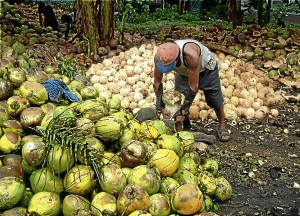
Matured coconuts are collected, dehusked and dried into copra to be sold as raw material for coconut oil. Photo by LA Villariba
The group of businessman Eduardo “Danding” Cojuangco Jr. on Thursday rebutted claims of “great injustice” to coconut farmers arising from a Supreme Court decision upholding the tycoon’s ownership of a significant stake in diversifying conglomerate San Miguel Corp. (SMC).
Cojuangco’s lawyer Estelito Mendoza said in a press statement that the block of SMC shares held for the benefit of coconut farmers should be distinguished from the 20-percent stake which was the subject of the court ruling and declared as lawfully belonging to Cojuangco.
“Mr. Danny Carranza is barking up the wrong tree. He might be thinking of another block of shares representing 31 percent of SMC which Mr. Cojuangco also bought in 1983 from the Sorianos for CIIF (Coconut Industry Investment Fund) Companies,” Mendoza said.
Carranza, secretary general of peasant coalition Katarungan-Quezon, earlier branded the high court’s decision as the “final execution” of coconut farmers.
The lawyer noted that the Sandiganbayan, in a “Partial Summary Judgment” dated May 7, 2004, had declared those shares equivalent to 31 percent of SMC as belonging to the government in trust for the coconut farmers.
During the Arroyo administration, those common shares held in trust for coconut farmers had been converted into preferred shares in SMC.
No evidence
Mendoza further stressed that the Supreme Court, in affirming the decision of the Sandiganbayan dismissing the complaint against Cojuangco, found no evidence showing that his SMC shares were acquired or paid for with coconut levy funds.
The 20-percent block of shares was acquired by Cojuangco from the Ayala group on top of the 31 percent stake shares held under the CIIF. These CIIF shares are very much intact, the lawyer stressed.
“Actually, the coconut farmers must be grateful to Mr. Cojuangco for buying those shares, which have increased in value tremendously,” Mendoza added.
“Incidentally, as to the statement in the dissenting opinion of Justice Conchita Carpio-Morales that the rejection by the Supreme Court of the claim that Mr. Cojuangco was a ‘business associate’ of President Marcos is the ‘joke of the century’ is not only unkind but unfounded,” Mendoza said.
Not a crony
Under Executive Order No. 1, in order that a person may be a “business associate” in this context, Mendoza said that person must be associated with Marcos in the acquisition of the alleged ill-gotten wealth.
He cited a testimony by businessman Enrique Zobel before the Sandiganbayan on Dec. 18, 1995, that Marcos had nothing to do with the Ayala decision to sell to Cojuangco.
“The reason the shares were sold to Mr. Cojuangco was that he offered … to buy them at a price higher than the market price at that time,” Mendoza said.
Mendoza also cited an official report of the Philippine Coconut Authority, which was audited by its corporate auditor, that no amount in the P9.69 billion levy collection was used to buy SMC shares.
With this final ruling, Cojuangco is now free to execute his plan to sell out of SMC, believed to be part of the tycoon’s estate planning. The ruling has also removed the political overhang that has hounded SMC since the 1986 Edsa People Power Revolution.
Plans to sell
Cojuangco, for his part, has already made plans to sell his 20-percent stake in SMC to his business allies. The stake in SMC owned by Cojuangco through 44 companies is worth about P37 billion which Top Frontier Investment Holdings Inc. has the right to take up until Nov. 19, 2012, under a two-year option involving the sale of 493.37 million common shares at P75 per share.
Top Frontier is 49-percent owned by SMC itself as represented by its president Ramon Ang, Cojuangco’s trusted ally, and 51-percent controlled by an investor group that includes former Trade Minister Roberto V. Ongpin, Iñigo Zobel and condiments king Joselito Campos.
Even if Top Frontier has yet to exercise such an option, the agreement already gives it voting rights to Cojuangco’s shares, making it the single most influential voting bloc in SMC at present.
Under Cojuangco’s leadership which began in 1998, SMC built up a pile of cash that funded a wave of local and overseas mergers and acquisition deals, allowed the entry of Japan’s beer giant Kirin Holdings as a strategic partner initially in SMC and later on spun off flagship unit San Miguel Brewery. His reign also marked SMC’s diversification into capital intensive but potentially higher yielding heavy industries.
Apart from its traditional food and beverage businesses, SMC now has interests in power generation, power distribution, oil refining, telecommunications, mining, toll-way development, airport development and banking.